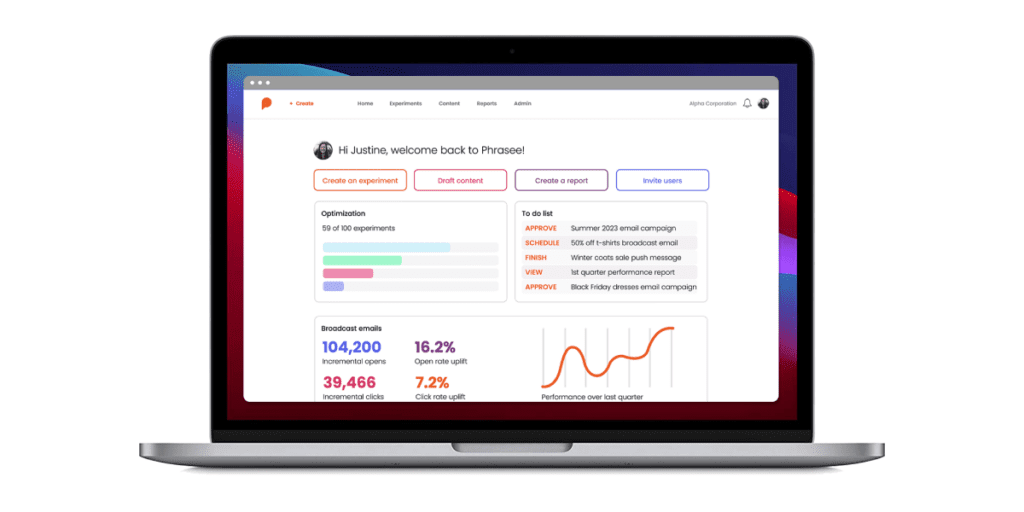You’d have been hard-pressed to find a marketer in 2015 who knew what a “large language model” (LLM) was, never mind how to use one.
That was the year that Phrasee was founded. Phrasee is a UK-based SaaS platform that uses generative AI to create, test and optimize content for large enterprise companies, including Sephora, Williams-Sonoma and GNC.
But with the advent of OpenAI and ChatGPT, the term “LLM” has entered the lexicon, and dozens of generative AI companies have cropped up, making for what Matt Simmonds, Phrasee’s chief product and technology officer, calls an increasingly “noisy” space.
But most of these newer AI startups aren’t much more than basic user interfaces slapped on top of publicly available LLMs, said Simmonds, who predicts the majority will disappear because they are undifferentiated.
The roughly 100-person company has run experiments on its customers’ content for the past eight years to figure out what drives the best performance. It produces AI-generated content that matches a brand’s voice, then runs automated A/B/n testing – an expanded form of A/B testing that compares “n” number of versions or variations against each other simultaneously to see what works best.
“It’s not enough to churn out content,” Simmonds said. “You need to make sure that when you’re generating content, it drives your bottom line.”
Short, short, long
Working in a world before LLMs were productized, Phrasee built its own approach to generating human-sounding language, Simmonds said, which gave it “complete control over the output of what is generated.”
Over the last two years, however, Phrasee has started to combine its own natural language generation AI with other LLM providers, such as ChatGPT, Anthropic’s Claude and Google Bard.
The combined tech can generate many more types of content than Phrasee could previously, including display ads, product descriptions, features lists, social posts, blog posts and articles.
AdExchanger Daily
Get our editors’ roundup delivered to your inbox every weekday.
Daily Roundup
Historically, Phrasee has focused on short-term content that’s one or two lines long, such as email subject lines, push messages and SMS messages.
Any output from an LLM is run through Phrasee’s brand voice controls and style guide, as well as its diversity modeling and deep learning performance prediction model.
The diversity modeling algorithm “works to reduce repetition and linguistic similarities” within a set of content variants, such as email subject lines, push messages or ads, Simmonds said. It also looks at previous experiments so content from past campaigns doesn’t reappear.
Producing a wide variety of content that “doesn’t all sound the same” helps boost performance, he said.
Phrasee’s global settings also block words and phrases in certain instances, such as when they don’t adhere to a brand’s standards and preferences. Humans review and sign off on all content before it gets pushed live anywhere, Simmonds said.
But there is no foolproof method that can remove all risks of bias or factual inaccuracy from AI-generated content, particularly long-form content that’s more than a few paragraphs in length, such as articles and blog posts.
Given that many of the large enterprises Phrasee works with are hesitant about AI-generated long-form content anyway, short-form and mid-form content that the company can test and optimize is still its “sweet spot,” Simmonds said.
“It’s very difficult to prove the performance of an article or blog,” he said.
More bridges to cross
Although most of Phrasee’s growth has been organic – the company raised just $5.3 million since it was founded – that changed in 2021 when it sold a majority 64% stake to private equity company Capital D.
With Capital D’s backing, Phrasee will focus on growing its presence in the US, where much of its leadership team is now based, and on expanding its addressable market beyond big enterprises.
Although Phrasee has made a name for itself with text-based content, the company plans to expand its generative capabilities into image, video and other content types for marketers, Simmonds said.
Later this year, Phrasee will also release a personalization tool that generates content “tuned to the specific profile of a customer,” he said.
To maximize engagement, the tool will combine the message context (such as whether a product has been abandoned in a cart) with a customer’s content style and tone preferences, which Phrasee calculates with its content engine. The tool will also generate these unique messages “on the fly,” Simmonds said, and in a fully automated fashion. The content will be text-based to start but could later extend to other content types.
“Personalization has been talked about forever but has never been nailed properly by many brands,” Simmonds said. “Generative AI has the potential to give brands a real opportunity to personalize at an individual customer level.”













